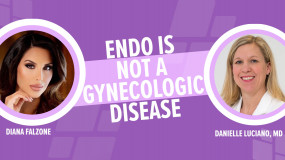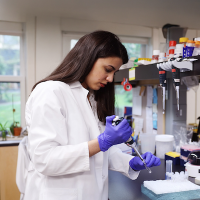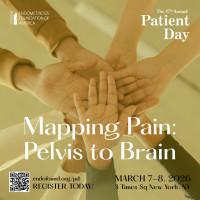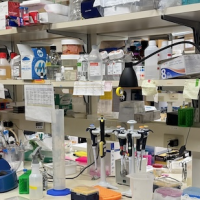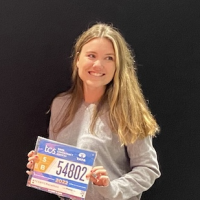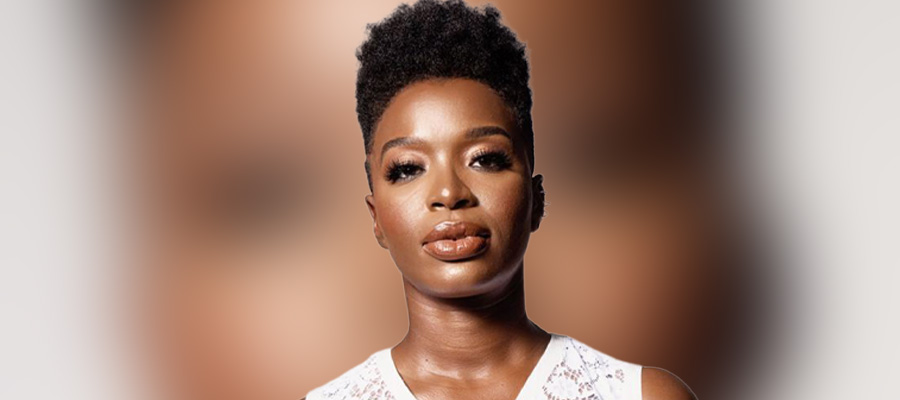
Fọlákẹ́ Olówófôyekù first experienced endometriosis symptoms as a teenager. Now 41, pain-free, and an outspoken advocate for those with the disease, Olówófôyekù will receive EndoFound’s 2025 Blossom Award on May 15 at the Blossom Ball in New York City. The actress and musician said she’s still digesting the honor.
“This award is for 25 years of pain,” she said. “It’s a reminder of how difficult it was to get people to believe what I was experiencing, that it wasn’t in my head. And it’s a huge thank you to Dr. Seckin for changing my life.”
Olówófôyekù starred in the CBS comedy series Bob Hearts Abishola from 2019 to 2024, was the voice of Amara in last year’s hit Disney film Mufasa: The Lion King, and writes and records music. Dr. Tamer Seckin is the cofounder of EndoFound and founder of the Seckin Endometriosis Center. He performed excision surgery on Olówófôyekù in 2022.
Olówófôyekù shared her story by phone with EndoFound last week from her native Nigeria, which will bestow two titles upon her later this month for her success, similar to being knighted in Europe. She’s also working on a documentary and creating a brand of organic essential oils, taking full advantage of the time endometriosis used to control.
“I feel great,” she said. “I don’t even know when I’m getting my period anymore. And when I do get it, I don’t have to take more than two Advil during my entire cycle.”
Olówófôyekù’s primary endometriosis symptom, pelvic pain, began with her first period at age 13 in 1996.
“It would start a couple of days before I’d get my cycle, would not ease up until about the third day, and would last about seven days overall,” Olówófôyekù said. “Those first few days were terrible. I threw up a lot.”
Her mother, like many mothers who don’t know about endometriosis, told her it was something every girl had to bear.
“My mom said she’d experienced it as a kid and that it stopped after she had children,” Olówófôyekù said. “So I think the expectation was that I would deal with it, and it would stop when I had kids.”
Olówófôyekù pushed forward, even attending school through the pain.
“I just dealt with it,” she said. “I remember times during exams when I couldn’t write and would put my head down on the table. Sometimes, the teacher would treat me with understanding and kindness and let me repeat the exam later. Other times, I’d fail.”
Olówófôyekù immigrated to America on her 18th birthday in 2001. She attended City College of New York, majoring in theatre while performing in small local venues. The pain remained constant.
“One time, I passed out in my apartment,” she recalled. “The paramedics asked me if I’d tried this or tried that and even mentioned that I may need surgery. But when they got me to the hospital, nobody there helped me. They were focused on getting my insurance information and social security card and then sent me to an overcrowded room of patients until a doctor could see me hours later. I asked them if they could please give me somewhere to sit, but they said there was nowhere. So I just stood there in pain.”
Olówófôyekù left the hospital without answers yet continued onward with her daily life and career.
“It was like pulling fifty tires tied behind me, but I had tunnel vision,” she said. “I didn’t dwell on anything. It was always, ‘What’s next?’”
She eventually landed guest roles on various shows, including Modern Family, 30 Rock, and Law & Order: Special Victims Unit. Checking her calendar to see if any opportunity conflicted with her cycle became a habit because of the pain’s grip. She finally started seeing doctors for prescriptions to get herself through each day, though relief was fleeting.
“I didn’t have access to good medical care, so I had to rely on what was free, and it wasn’t always the best,” Olówófôyekù said. “Every doctor I went to would say something [negative] about the last doctor, and then they’d prescribe me something of their own that wouldn’t work any better—or they just wouldn’t believe me.”
She recalled seeing a doctor in New York in 2011, the first to listen to her story and prescribe a drug that was supposed to be strong enough to curb the pain. Olówófôyekù’s first cycle after filling that prescription occurred when she was filming Law & Order—but she had to rely on sheer mental grit to get through her scenes.
“I was so happy to have medication that was actually going to work—but it didn’t. I was behind my trailer throwing up,” Olówófôyekù said. “My friend looked up the ingredients of the pills and found they were the equivalent of a Motrin or Tylenol. She went with me to my next appointment and forced the doctor to bring out her books to find something stronger. That’s when she prescribed me narcotics. They’re the first thing that worked and made my days tolerable.”
Though Olówófôyekù was responsible when taking the potent drugs, she said a new federal law eventually passed that made it more difficult for doctors to prescribe them.
“I’d go to a doctor and have to convince them I was in pain for them to fill a prescription,” she said. “It became a monthly thing I had to do and was always a problem. It was treacherous, disheartening, awful.”
When Olówófôyekù moved to Los Angeles, she convinced a doctor to prescribe her six months of narcotics at a time, post-dating each monthly prescription.
“I promised her that I wasn’t going to abuse them or become addicted to them,” Olówófôyekù said. “I only took them when I had to or in smaller doses. If I could save them and make them last longer than six months, then I did. She also checked on me to make sure I was using them properly.”
With the pain at bay, Olówófôyekù got her life into a rhythm. But when she called her doctor to get her next six-month prescription, the doctor was gone.
“They said she left, and nobody knew where she was,” Olówófôyekù said. “And the new doctor said, ‘This is not an appropriate remedy. I’m not giving you these pills anymore. You need surgery or something.’ I said, ‘Fine, but until I find someone to do surgery, what am I supposed to do?’ She didn’t know and didn’t care.”
Olówófôyekù hung up the phone and broke down in tears, but there was a silver lining in that exchange: it forced her to search for a better doctor. She found one who understood her pain, could recommend her to a surgeon, and would prescribe her painkillers until she could have surgery.
“This was around 2017. It was the first time I’d felt compassion like that from a doctor,” Olówófôyekù said.
She had surgery in 2018 after shooting the pilot for Bob Hearts Abishola. The surgery revealed significant endometriosis in numerous areas. It was the first time she’d been diagnosed with it or had heard of it—but the surgeon wouldn’t touch it.
“After the surgery, he said, ‘I’m sorry, I couldn’t help you. It’s too advanced for me,’” Olówófôyekù said. “He didn’t want to mess anything up.”
With CBS picking up her show, Olówófôyekù didn’t immediately pursue surgery from anyone else. The opportunity and time commitment were too much for her to risk being out of work for a prolonged time, so she returned to living with the pain.
“When I was in theatre school, I would do shows where I’d throw up backstage, come out and pretend I was okay, then go back and throw up some more. That was the only way to get through it, and it was still that way on my show,” she said. “I’d be backstage in pain, they’d yell ‘action,’ I’d go out and do what I had to do, and then return backstage and crouch. Standing up made the pain worse. I had to stay completely immobile.”
Olówófôyekù even resorted to unorthodox methods to get herself through situations.
In 2021, while backstage in her show’s hair and makeup room, she found out she’d been invited to attend the Grammy Awards in Las Vegas the following week. But when she checked her calendar, she decided she couldn’t go because it was at the same time as her period. When one of the makeup ladies heard that, she locked the door and told Olówófôyekù to lie down on the counter.
“She said, ‘We’re going to make your period come early.’ I said, ‘What are you talking about?’ She told me not to worry, got glass cups, and cupped my belly [cupping is a therapy rooted in Chinese medicine that can improve blood flow]. It worked! My period came early, I think the next day, and I got to go to the Grammys.”
In 2022, with her show still airing and no plans to have surgery, Olówófôyekù’s life changed most unexpectedly when a member of her public relations team called her with another job prospect.
“I told her I needed to check my calendar to make sure I wouldn’t be on my period,” Olówófôyekù recalled. “She said, ‘What? What do you mean by that?’ When I explained it to her, she said, ‘Oh, yeah. I have a client, Padma Lakshmi, who had this.’” Lakshmi, a model and television personality, is a patient of Dr. Seckin’s and the cofounder of EndoFound.
“That’s how I found Dr. Seckin. After that, my life was changed forever,” Olówófôyekù said. “It was a six-hour surgery. He removed endometriosis from everywhere and had to readjust my pelvis. We even had a moment in his office, post-op, where we both teared up. He said, ‘You probably told people about your pain who didn’t believe you, and those who did believe you may have thought your pain was a 10, but it was more like a 20-something.’”
Olówófôyekù is now using her platform to help women who are suffering as she did. She wants more doctors trained to do excision surgery, including in Nigeria. She wants to teach patients about the importance of good nutrition while living with this disease. And she wants to raise awareness among medical professionals.
“I was dismissed a lot,” she said. “In Nigeria, people had compassion but thought what I felt was normal. In America, they just didn’t believe me. It was like I had to convince them I wasn’t a drug addict.”
She’s also focused on caring for herself, living a life physically and psychologically that she hasn’t known since she was a child.
“Starting when I was 13, I never had all the days of my month, ever,” Olówófôyekù said. “I had a week of pain, a week of recovering from the pain, a week of getting ready to deal with the pain again, and then the pain again. Once I got my 30 days back after the surgery—that’s why I’ve been working so much. I’m trying to catch up on all the days I missed in my life.”



